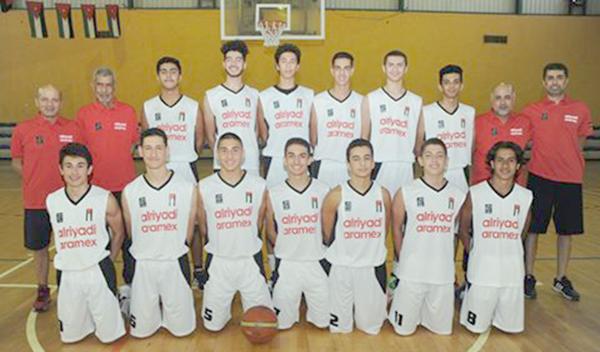You are here
Riyadi to hold annual Jumana Salti Tournament, retire No. 10 jersey
By Aline Bannayan - Dec 20,2015 - Last updated at Dec 20,2015
AMMAN — Although it’s been nearly 40 days now, friends and colleagues choose to remember a friend’s passing by celebrating achievements, rather than loss.
Jumana Salti, Jordan’s all-time woman basketball player, was found dead alongside sister Soraya on November 6. While loved ones are trying to come to grips with the fact of the passing of two inspirational figures, in an incident that sent shockwaves through society, Jumana’s colleagues and basketball community are adamant to continue to celebrate her on and off court achievements.
Riyadi-Aramex Club announced this week that they will hold an annual Jumana Salti Tournament. “Teammates, national team players and colleagues all want to celebrate a great friend and player. We intend to make it an annual gathering,” Riyadi Secretary-General Fadi Sabbah, Jumana’s coach in the mid-90s told The Jordan Times.
Describing her legacy at the club, Sabbah said: “Jumana inspired young players, even those who never played alongside her. They merely watched her play with the seniors and her dedication and attitude made them want to do the same.”
Her club also announced it will retire Jumana’s No. 10 jersey in honour of her. Sabbah added, “this season, Riyadi’s players will all wear No. 10 during warm-up, to remember a teammate we lost too soon.”
Tala Fakhoury, a Riyadi player recollects meeting Jumana while training for the national U-18 team. “She dropped in to one of our sessions and as a young girl, meeting Jumana was transformative. She was living proof that Arab women can excel in sports and we can be accomplished not only nationally, but internationally.”
Underlining she was the best female basketball player in the history of Jordan, Sabbah noted Jumana led her team in rebounding and points in all matches and was the only player to start every game that she played. “She worked harder than anybody else and had the biggest smile and most positive attitude that contributed to her success at the highest levels with the national team and US NCAA Basketball,” he added.
Teammate Rana Husseini remembers Jumana as “the most brilliant player” in their 10-year career together. “What I remember most is how Jumana showed great respect to all and appreciated the senior players who remained in the game. She was also always supportive to everyone on and off the basketball court.”
Husseini, who was national team captain when Jumana led Jordan at the Asian Championship in 1995, added “her energy and love of the game reflected positively on the performance of the rest of the team. Every time Jumana was playing with us, we felt we would win the game… and we did.”
Jumana proved to be an outstanding all-around athlete. Starting with the third grade, she started playing little league football for around 10 years while attending the American Community School in Amman. When it came to sports, particularly basketball, she dominated.
At age 15, she joined Jazira-Aramex Club (now Riyadi-Aramex). It was from there that she took women’s basketball to another level in Jordan. By 1995, Jumana was part of the national team which was regrouped after a 12 year absence to represent Jordan at an Olympic qualifying tournament in Japan. That trip and how it was made possible formed a bond among players, and even impacted Jumana’s higher education and achievements afterwards.
Although Jordan won one of six matches, the real triumph was that the team made it there. With no budget allocated to the women’s team, the players, coach and team managers had to fundraise themselves. Just days before the tournament began, the team still lacked about JD5,000 needed for the trip to Japan. After The Jordan Times detailed the team’s plight, HRH Prince Hassan covered the necessary amount to send the Jordanians to Japan. The team arrived two hours after the opening ceremonies began.
Jumana and Jordan made a history. Jumana, who averaged 20 points a game, was named to the tournament’s five-member FIBA Asia All-Star team, as Jordan became the first Arab team to compete in the Asian Basketball Championship. After pursing her higher education in the US, Jumana later became the only Jordanian female to play at the NCAA Division 1 level in any sport in the US.
Tala Mauge notes: “Jumana and I travelled half way across the world representing our country. My eyes tear up every time I think of her, but I also smile because memories of her bring love and joy to my heart.”
“Jumana’s smile, purity and commitment to things made everybody want to be her friend. She impacted so many people effortlessly. She was ahead of her time in all that she did. She was bigger than life, always the most gracious , a true drop of heaven,” she added.
For Jumana, who in 1996, was voted by sports editors as the “Best Woman Basketball Player in Jordan”, basketball was more than just a pastime. It was a way of life, a game which she took to heart.
Jumana’s parents were the driving force behind their daughter’s outstanding athletic career. She had often noted her parents support and how her father Amer, who was an avid athlete himself, was like her coach, attending every game since she was in the second grade. Jumana had told Brigham Young University (BYU) Magazine if it wasn’t for her mom Rebecca, she wouldn’t be playing either while even her grandmother would drive down from Salt Lake City to watch her play.
Jumana, who was at BYU before moving and graduating from Cornell University in 2000, was dubbed the “the Michael Jordan of Jordan”. In the BYU profile, the magazine says how “her 200-watt smile” lit up the arena even when her team was losing”.
Both sisters were inspirational in their life and careers. Soraya, who excelled in volleyball, spearheaded the Youth Empowerment Programme INJAZ before moving on to form the regional INJAZ Al Arab impacting over 2 million youth. In 2006, she won the Schwab Social Entrepreneur award for Jordan, became a Young Global Leader of the World Economic Forum and was the first Arab woman to win the Skoll Award for Social Entrepreneurship in 2009. In 2013, Soraya was named as one of the 100 most powerful Arab women by Arabian Business.
Jumana, who earned her MA in Economics in 2006 from the London School of Economics had previously worked at the Royal Court and was last a top-level executive with Price waterhouse Coopers in the UAE, leading the education and not-for-profit consulting practice in the MENA region.
Jumana, was mourned by national team players from Jordan, Egypt, Lebanon and Syria.
Friends and teammates, who had nicknamed her “Jimmy”, share a common great sense of loss and all remember her smile that lit up the room.
“I can never forget her smile and how fast she switch from happy face to serious once she started playing,” said Mo’tasem Salameh, a former national team player who underlines Jumana was the finest woman basketball player to ever represent Jordan.
On and off the court, Jumana energy always naturally impacted those around her. Longtime friend Lamia Saket, says she recently taught Raya, her niece, how to dribble and shoot. “Raya says she only started enjoying the game when Jumana taught her.”
Saket, who would join Jumana horseback riding, added: “Jumana always encouraged me saying “don’t let others influence you or affect you with their negative energies. Rise above it all.”’
Hala Muheisen, a friend and teammate added: “Jumana used to give me power when on the court together. She was my hero.”
Hala Ghattas, who played alongside her in regional friendlies and at the 1997 Pan-Arab Games in Beirut, summed it up saying: “Her footsteps will never be erased from Jordanian basketball courts.”
Friends hope the memories of Soraya and Jumana will always inspire others. A common thought among all was: “You’ll always be missed, your memory will always be cherished. In our hearts you will live forever.”
Related Articles
AMMAN — Soraya Salti, one of the two sisters who were found dead after falling off a roof of an under-construction building in south Amman e
AMMAN — Riyadi-Aramex U-16 team will be competing in the UAE this week as the 2nd Dubai International Basketball Tournament tipped off Satur
AMMAN — Investigators have concluded that there is no suspicion of foul play in the deaths of Soraya and Jumana Salti who fell off the roof


















